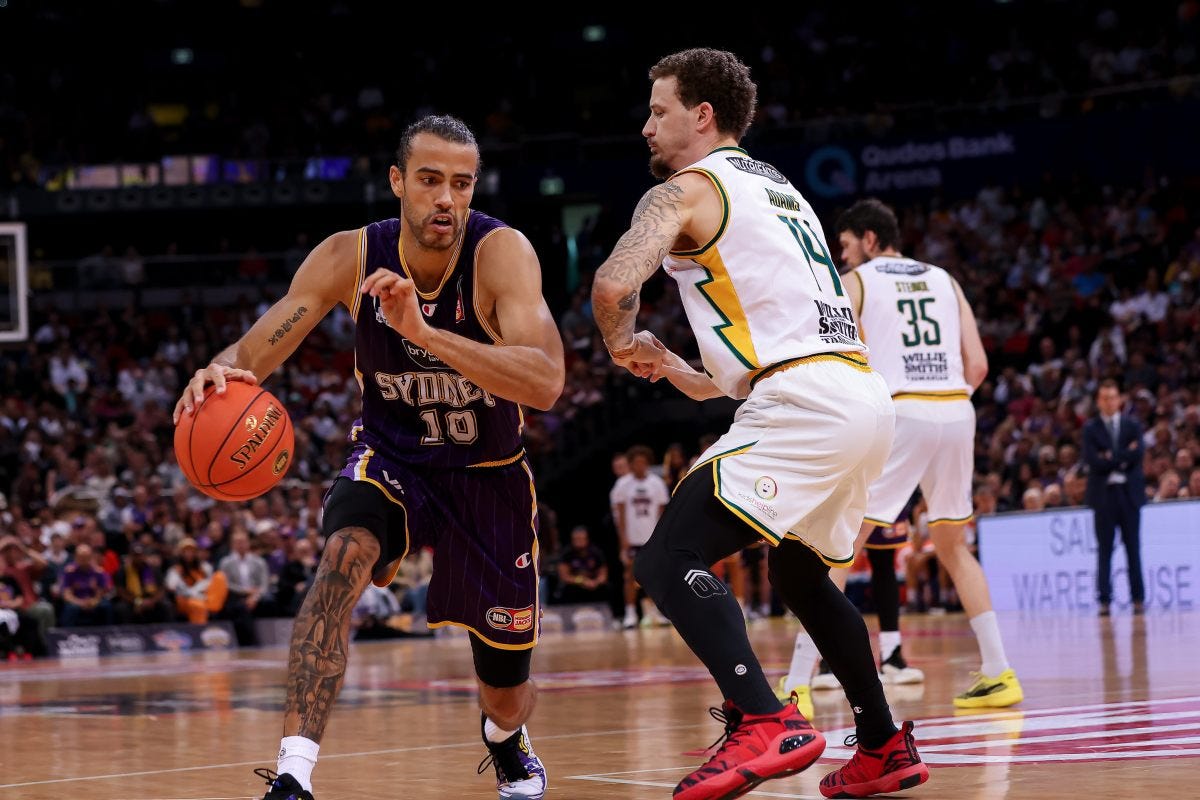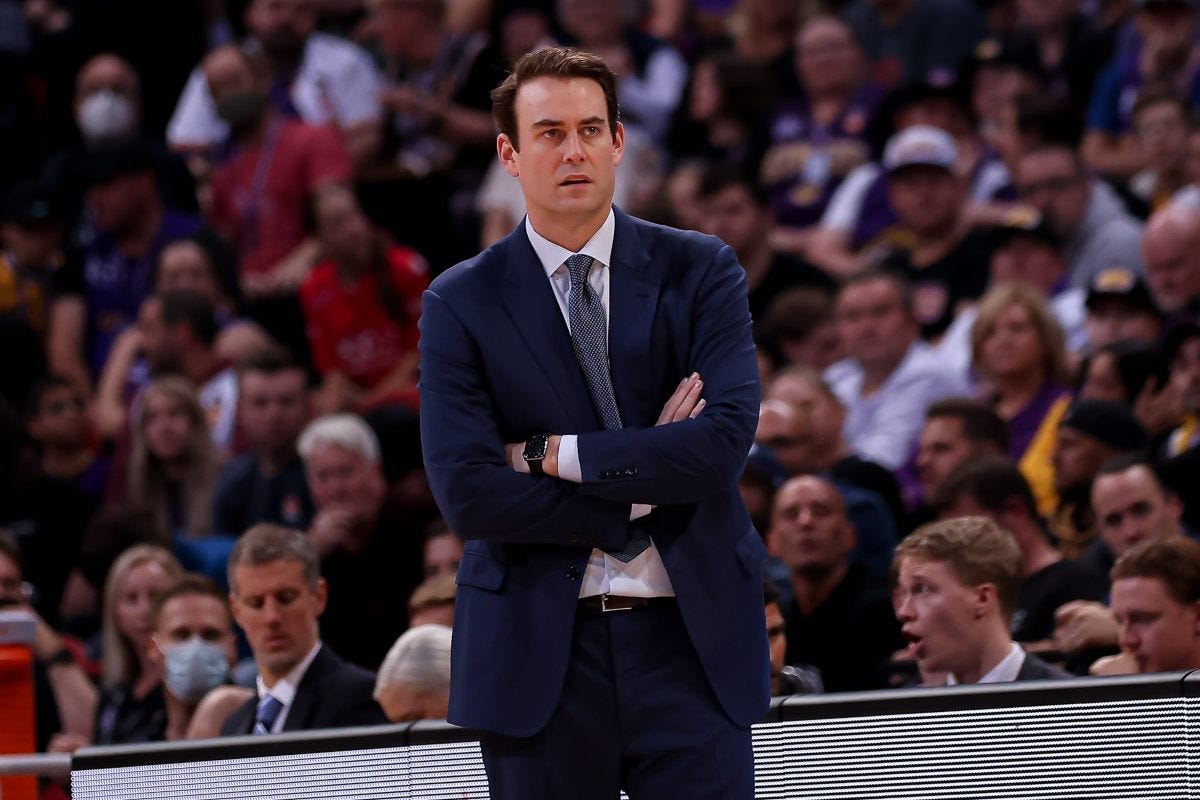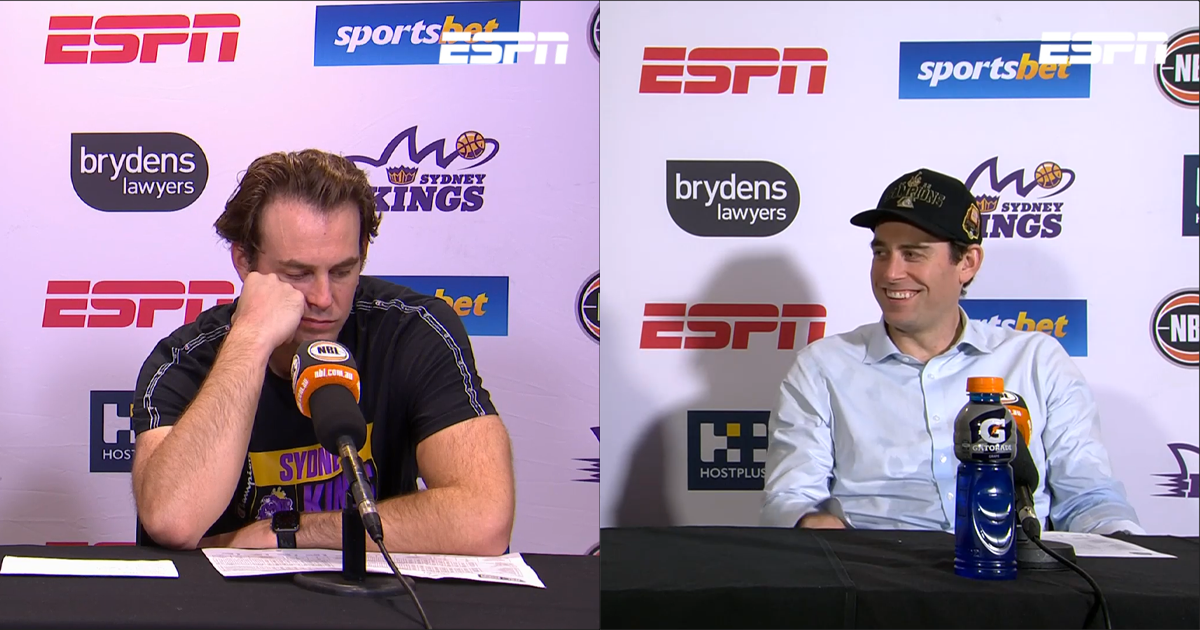How Sydney became the NBL's Kings
It was a slow start. But by season's end, the Sydney Kings became one of the NBL's most impressive championship teams in recent history.
Credit: May Bailey Photography
“Remember this moment in our locker room as a catalyst in our season turning around.”
Those words were spoken by Chase Buford on January 21, with the Sydney Kings coach sitting in the middle of an otherwise silent locker room. His side had just slumped to their fourth straight loss against the Brisbane Bullets, and the club’s documentary series, Building the Kingdom, showed the coach’s postgame response in full.
There was frustration, despair and, of course, plenty of expletives. It was the build up of a horrific first two months of the season for the Kings, all coming out at once. Injuries to key players, a long COVID-19 layoff, offensive struggles and fourth quarter collapses left the team floundering with a 3-6 record.
Star signing Jaylen Adams was struggling to shake off an early season injury; fellow import RJ Hunter would be ruled out for the season, joining Jordan Hunter on that list; DJ Vasiljevic was still finding his feet after returning from a torn Achilles; and leading the way was Buford, a coach freshly arrived in the country and with no NBL track record to point to. All of those factors and more were evident in Buford’s exasperated speech to his charges.
At the end, though, was that glimmer of hope, followed by a firm statement from the coach.
“Heads up — we’re a good basketball team, we know that in this room,” Buford said as his players huddled around him. “Everybody else outside this room thinks we’re f***ing soft and all that s**t, but we know who we are.”
Four months later, and everybody outside that locker room now knows who the Kings are; NBL champions.
After that loss to the Bullets, the Kings morphed into one of the most dominant teams in league history. Following that 2-6 start, Sydney went 21-3 over the remainder of the season. That stretch included a historic 13-game winning streak and a 5-0 sweep through two finals series, as they brushed aside anyone that dared to challenge them.
From preseason title fancy, to talented underachievers, and then to one of the most comprehensive champions in the NBL. How did the Sydney Kings right the ship and win the club’s first title in 17 years?
By the numbers
Even during their early season slump, the Kings were a respectable defensive team. Across those first nine games they ranked fifth in the league in defensive rating, per Spatial Jam, and allowed less than 80 points per game.
Their biggest issues came offensively, where they struggled to create points and consistently fell flat. They were the least efficient team offensively by a wide margin, scoring just 96.1 points per 100 possessions while shooting below 40% from the field, per Spatial Jam. Buford brought with him a reputation as a run-and-gun offensive coach, and the Kings certainly bought into that philosophy, but the positive results from his time with the G League’s Wisconsin Herd didn’t immediately follow.
In hindsight, the reasons for those struggles are clear. The Kings brought in Adams to run their offence, and in addition, he was the only player that Buford had some prior experience with from their stint with the Herd. With Adams sidelined for five of those first nine games with an ankle injury, Sydney’s offence was left rudderless in a time that Buford was still learning about his players. Add in the season-ending injury to star wing signing RJ Hunter, and the Kings were short on shot creation on the perimeter.
To make matters worse, they were falling in a heap late in games on both ends of the floor. The team won just one fourth quarter across its first nine games, and in the last two games of that four-game losing streak they gave up 30 and 31 points to non-finals teams New Zealand and Brisbane.
That was certainly a point of focus for Buford in the aftermath of the loss to Brisbane. “I’m f***ing sick and tired of coming in after a game, outplaying somebody for three f***ing quarters, and then sh***ing the bed,” he told his team. “We talk about all these things, we have to be able to close games the right way.”
Even as the team began rattling off wins, their last quarters stayed largely the same. Across the remainder of the regular season, a stretch where the team went 16-3, they won just seven fourth quarters while conceding an average of 21.5 points in each. The difference was, they were suddenly building such commanding leads through the first three periods that it didn’t even matter.
Surprisingly, it wasn’t Sydney’s defence that led them to that point — in fact, they actually slipped a little at that end of the court. Instead, it was a historically good offence that carried them all the way to the title.
The team lifted significantly with the return of Adams from injury, but it was the addition of Ian Clark that took them to another level. The former NBA champion signed as a replacement for RJ Hunter, and despite coming off the bench his impact was immense. In the 18 games after his signing, Sydney poured in 119.6 points per 100 possessions; according to Spatial Jam’s database, that would be the highest mark over a season since 1991, when almost every game hit triple figures scoring and teams regularly topped 140 points.
With elite talent in the backcourt and on the front line, Buford quickly figured out how to capitalise once his team was fully assembled. The Kings still maintained that run-and-gun identity, finishing the season second in transition possessions and third in pace, but they found other ways to score in the half court. They were the most efficient scoring team from the pick and roll across the season, per Jordan McCallum, with Clark and Adams ranking first and third respectively among all players on those plays (min. 10 possessions).
All of that helped the Kings to finish the season in historic fashion. Their 21-3 end to the year included a 13-game winning streak, the second longest in club history; 12 straight road games, the most by any team in a single season; and just the seventh full finals sweep in the 37 seasons since multi-game series were introduced.
The players
These Kings will be remembered as a phenomenal team, a hugely talented unit and one of the NBL’s most impressive champions. They possessed individual talent that may be unmatched, with total buy-in from the players allowing them to mesh in a way that not many super teams can.
From the outside looking in, it all started with Adams. The league MVP’s importance became clear as the team struggled without him and then blossomed upon his return. The numbers were impressive enough, as he averaged 20.4 points and 5.8 assists per game while shooting over 40% from deep, but it was the way he balanced scoring and facilitating that unlocked the team’s full potential.
Perhaps most importantly, he knew when to step up and take over the game. Sydney’s fourth quarter struggles are well-documented, but Adams consistently kept them afloat and closed out a number off wins by willing them home.
That gave us plenty of highlight plays, most notably his game-tying, posterising dunk against the Bullets that will likely live on as the defining play of his MVP season:
If Adams was the on-court leader of the Kings, then Cooks was the team’s heart and soul. Speaking after they sealed the championship, Buford made sure to make that clear to everyone.
Credit: May Bailey Photography
“This guy, I’ve seen that he feels like he has an impostor syndrome as a leader. He’s the freaking leader of this team, through and through,” Buford said. “We followed him every freaking step of the way and I just couldn’t be more proud of [him].”
It helped that Cooks was also one of the best forwards in the league this season, and he took his game to another level with the championship on the line to earn Grand Final MVP honours. His frontcourt partner Jarell Martin stepped up with him, and the two combined to average 35.3 points and 23 rebounds per game in the grand final series to control the interior for the Kings.
The same could be said for Clark, who poured in a season-high 22 points in the closeout game to fill the void left by Adams. The NBA veteran bought into his bench role, and Buford recalls that he was contributing in huddles and timeouts even before he suited up for his first game. As a result, he played in just two losses and added another championship ring to his collection
“Ian came up to me after the first loss, and he was mad. It meant that much to him, he was like ‘I didn’t want to lose with me here’,” Buford said. “He’s just a special dude, he’s a special player, he’s a hell of a player, but he’s just a better person.”
Behind that veteran core, Sydney’s youth movement continued to grow into their games on the big stage. None did that more so than Dejan Vasiljevic, who returned from a torn Achilles and a year-long absence to lock down a starting role. When Sydney’s backs were against the wall in game two of the grand final series, in front of a hostile crowd in enemy territory, he stepped up and made the biggest shot of the season.
Wani Swaka Lo Buluk went from an injury replacement player to a permanent starter and Buford’s go-to defensive stopper. Makur Maker became the first Next Star to win an NBL championship, playing meaningful minutes and making a mockery of those that said Clark’s signing should have been a big man instead. Angus Glover continued his remarkable rise from three ACL injuries to be a key member of Sydney’s rotation.
From top to bottom, Sydney’s roster is full of incredible stories matched by incredible talent. Put them all together, and you have a group of NBL champions.
The coach
Plenty of credit should go to the man that pulled those players together.
Credit: May Bailey Photography
Most opposition fans will hate acknowledging the role that Chase Buford played, because most of them hate Buford. Throughout the season, he became known for his sideline tirades, cagey post-game pressers and expletive-laden speeches more than his coaching acumen.
The Kings knew the character that they were getting when they hired Buford, as club advisor Luc Longley explained in an interview for Building the Kingdom. “He was excitable, and he has a bit of form on being excitable, it’s gotten him into trouble in the past,” Longley said. “We found that charming — we liked the fact that he’s an energetic, young guy who’s got a massive appetite for work and a massive love of the game.”
Say what you will about Buford’s antics, but they were important during the team’s early-season struggles. The coach willingly became a lightning rod for his players, absorbing the public criticisms when they lost and quickly passing off the credit when they won. Eventually, thanks in large part to Buford’s ability to rally his troops, they started to win a lot more than they lost.
“He burns hot, and ultimately that will rub off on our team,” Longley said during the team’s early losing streak. “You can learn a lot about someone in the locker room after a game, and Chase takes the wins and losses as hard as anyone I’ve ever seen.”
It’s clear that everything Buford does comes from a place of immense passion, for both his team and the game of basketball. Whether you think he crosses the line at times (and based on his multiple sanctions, the league office certainly does), it’s hard not to respect the way he backs his players while always wearing his heart on his sleeve.
At the end of the day, everything in basketball is judged by wins and losses. Buford was brought in to lead a talented roster to a championship, and that’s exactly what he did. At just 33 years old, he is the fourth youngest championship-winning coach in NBL history.
Even with the title secured, he was still quick to pass off the credit to his players. “I didn’t do this, it was all the dudes dressed in purple tonight,” he said post-game. “I just couldn’t be more proud of these guys, they are the ones who earn it.”
After overcoming injuries, COVID-19 layoffs and plenty of external criticism, it’s fair to say the entire Kings organisation has earned it. With Cooks aiming for an NBA shot, Maker declaring for the draft and Vasiljevic exploring his options in Europe, it’s impossible to know what next year’s Kings might look like. Regardless of what happens, though, they are now in the history books as one of the NBL’s most remarkable championship winners.
Way back in January, in the middle of that quiet locker room, Buford told his players that they were a good team. It’s safe to say that no one is questioning that now.






